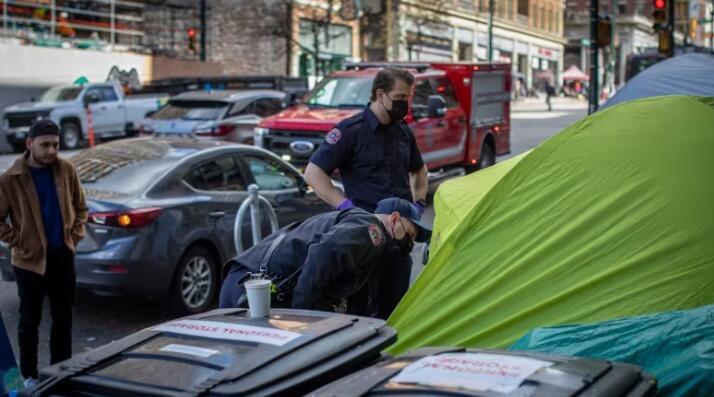Who is responsible for tent cities and homeless encampments in B.C.?

Incidents in Nanaimo, Prince George raise questions around welfare of unhoused people
Recent events, including a violent attack, at homeless encampments and tent cities in B.C. have raised questions about who is responsible for them, and what is being done to help people experiencing homelessness in the province.
On Monday, a man was shot at an encampment in Nanaimo, on Vancouver Island, while attempting to retrieve an item allegedly stolen by someone who resided there.
A day later, the city of Prince George voted to create a centralized homeless camp in the Moccasin Flats area, to stop camps from spreading across the city due to public safety concerns.
The incidents raise the complicated questions of what rights are afforded to those experiencing homelessness, and who is responsible for their welfare.
Here are some answers to those questions.
- Prince George adopts centralized homeless camp to combat spread of shelters elsewhere
- Nanaimo business owner shot trying to recover stolen property from encampment
Is it illegal to be homeless in B.C.?
No. There’s nothing in Canada’s Criminal Code that makes it a crime to be unhoused; the Charter of Rights and Freedoms includes protections for people in public spaces.
“The main section of our Charter, which applies in the context of people sheltering outside, is section 7,” said Anna Cooper, staff lawyer at Pivot Legal Society who works with unhoused people.
“[It] basically protects the safety of your person and your possessions.”

However, people who live in tents or makeshift shelters in cities can be in contravention of municipal bylaws around zoning, outdoor camping or fire safety.
Additionally, Cooper says, police can charge someone sleeping outside with the criminal offence of obstructing a peace officer. Police can also enforce the civil penalty of trespassing on private property.
Why are homeless encampments and tent cities allowed?
While many homeless encampments are in violation of municipal bylaws or trespassing acts, courts have ruled before that cities may not evict them without providing residents appropriate housing.
For instance, B.C. Supreme Court justice Christopher Hinkson ruled in 2021 that the City of Prince George could not dismantle the Moccasin Flats encampment, due to a lack of suitable alternatives for residents.
- Abbotsford homeless win in B.C. Supreme Court
- Residents ‘overwhelmed’ after judge rules they can stay in CRAB Park encampment
“We’ve had cases where [unhoused] people win at the first instance, but then the city just keeps pushing through the court system until they get that rubber stamp to evict people, even to nowhere,” Cooper said.
Do cities have a legal obligation to provide housing?
According to Cooper, there are no specific laws that guarantee a right to housing in Canada.
She says Canada’s Charter and federal laws have not yet caught up to international human rights treaties the government has signed on to, which provide for the right to housing and the right to not be forcefully evicted.

“That being said, governments do have requirements to not discriminate against people,” she added. “The way that homelessness is manifesting … it is disproportionately impacting marginalized groups protected by those codes.
“There is an argument that governments are discriminating in the way that services such as housing are being provided.”
- Abbotsford, B.C., sorry for using manure to drive out homeless
- Downtown Eastside residents call for ‘dignified’ housing amid tent removals during cold snap
What are the province and cities doing about it?
Under B.C.’s Local Government Act, cities have a broad range of powers when it comes to housing — from zoning to property taxes — but not the ability to fund and build their own housing.
That is largely a provincial matter, under Crown companies like B.C. Housing.
In response to concerns around the Moccasin Flats encampment, Premier David Eby said B.C. was working with communities around the province to “get them the resources” to open housing and close encampments.

“Encampments are not a solution to homelessness,” he told Carolina de Ryk on CBC’s Daybreak North. “Getting people inside into dignified housing is priority one.”
Asked whether he would overrule municipal decisions on homelessness, as he did when he ordered a Penticton shelter to remain open in 2021, Eby said he would only do that if there was a “major issue.”
He said B.C. Housing is acquiring buildings to create housing in the city, but labour and supply chain issues were delaying construction.
In a statement, a B.C. Housing spokesperson said more than 40,000 new homes have been built or are underway since 2017. Over 5,000 of those are supportive homes for low-income people, and 2,200 are under construction.
Related News
Trade war, slumping border traffic: What does that mean for the Gordie Howe bridge?
Amid U.S. President Donald Trump’s tariffs which have triggered a trade war with Canada, cross-border trips haveRead more
Trump administration threatens Harvard’s foreign enrolment, tax-exempt status
U.S. Homeland Security Secretary Kristi Noem speaks during an event on April 9, in Washington,Read more
